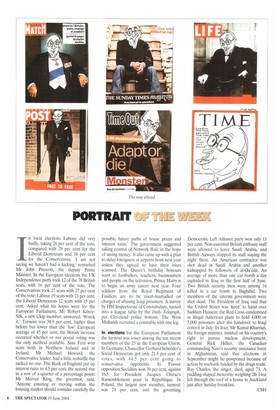PORTRAIT Ji 1 n local elections Labour did very badly,
taking 26 per cent of the vote, compared with 29 per cent for the Liberal Democrats and 38 per cent for the Conservatives. 'I am not saying we haven't had a kicking,' remarked Mr John Prescott, the deputy Prime Minister. In the European elections the UK Independence party took 12 of the 78 British seats, with 16 per cent of the vote. The Conservatives took 27 seats with 27 per cent of the vote; Labour 19 seats with 23 per cent; the Liberal Democrats 12 seats with 15 per cent. Asked what his hopes were for the European Parliament, Mr Robert KilroySilk, a new Ukip member, answered: 'Wreck it.' Turnout was 38.9 per cent, higher than before but lower than the 'low' European average of 45 per cent; the British increase occurred whether or not postal voting was the only method available. Sinn Fein won seats both in Northern Ireland and in Ireland. Mr Michael Howard, the Conservative leader, had a little reshuffle but sacked no one. The Bank of England put up interest rates to 4.5 per cent, the second rise in a row of a quarter of a percentage point; Mr Mervyn King, the governor, said, 'Anyone entering or moving within the housing market should consider carefully the
possible future paths of house prices and interest rates.' The government suggested taking control of Network Rail, in the hope of saving money. It also came up with a plan to delay foreigners at airports from next year unless they agreed to have their irises scanned. The Queen's birthday honours went to footballers, teachers, businessmen and people on the television. Prince Harry is to begin an army career next year. Four soldiers from the Royal Regiment of Fusiliers are to be court-martialled on charges of abusing Iraqi prisoners. A survey by HM Inspectorate of Constabulary, turned into a league table by the Daily Telegraph, put Cleveland police bottom. The West Midlands recruited a constable with one leg.
In elections for the European Parliament the turnout was lower among the ten recent members of the 25 in the European Union. In Germany, Chancellor Gerhard SchrOder's Social Democrats got only 21.5 per cent of votes, with 44.5 per cent going to conservative opponents. In France opposition Socialists won 30 per cent, against 16.5 for President Jacques Chirac's Rassemblement pour la Republique. In Poland, the largest new member, turnout was 21 per cent, and the governing
Democratic Left Alliance party won only 11 per cent. Non-essential British embassy staff were allowed to leave Saudi Arabia, and British Airways stopped its staff staying the night there. An American contractor was shot dead in Saudi Arabia and another kidnapped by followers of al-Qa'eda. An average of more than one car bomb a day exploded in Iraq in the first half of June. Two British security men were among 16 killed in a car bomb in Baghdad. Two members of the interim government were shot dead. The President of Iraq said that the United States was 'keen' to hand over Saddam Hussein; the Red Cross condemned as illegal American plans to hold 4,000 or 5,000 prisoners after the handover to Iraqi control in July. In Iran, Mr Kama! Kharrazi, the foreign minister, insisted on his country's right to pursue nuclear development. General Rick Hillier, the Canadian commanding Nato's security assistance force in Afghanistan, said that elections in September might be postponed because of action by warlords funded by the drugs trade. Ray Charles, the singer, died, aged 73. A pudding-shaped meteorite weighing 21b 14oz fell through the roof of a house in Auckland just after Sunday breakfast.
CSH


































































 Previous page
Previous page